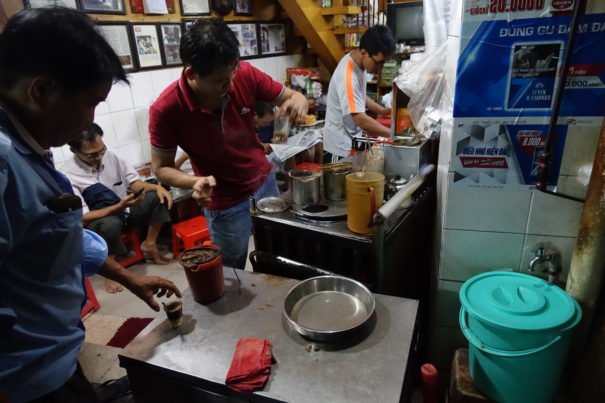
The Coffee Stand With a Light That Never Goes Out

The Coffee Stand With a Light That Never Goes Out
Coffee in Saigon
A full moon hangs low over the city as I drive across the Saigon Bridge at 4:30 a.m. on a Monday, headed to an unnamed coffee shop in Phu Nhuan District. Neon lights flicker on along the road as the buzz of motorbikes builds in the air. Saigon is waking up. I will pass countless cafés and coffee vendors on my way, but at the one I am headed to, the lights have not yet gone out from the previous day. They’ve been burning for the past 50 years.
Pulling into the narrow alley at 330 Phan Dinh Phung, tiny plastic stools hug the walls outside of the hole-in-the-wall coffee shop. Old men amble around smoking cigarettes and reading the local paper, while a young, bleary-eyed couple sits propped up against each other, fighting off sleep with a couple of cà phê sữa đá: iced coffee with condensed milk.
Within the brightly lit shop, which contains two tables, a coffee grinder, and a stainless-steel stovetop over a charcoal fire, a man filters coffee through a stocking-like cloth amidst the soot-covered walls, the same way his parents have long been doing here and his grandparents before them.
In Vietnam, coffee is both a national pride and pastime. The ubiquitous method of preparation is through a metal filter that produces the liquid, drop by dawdling drop. At no other time in my year of living in and traveling throughout the country have I seen this method of brewing coffee in a pot over a fire before pouring it through a piece of cloth. This is, as it turns out, the remnant of a bygone era that draws devoted drinkers for its smooth, rich flavor.
Later in the day, I come back during Pham Ngoc Tuyet’s shift. She is the matriarch of the family, in her mid-60s, and the mother of the smiling man. A petit woman of pure, frenetic energy.
In between filtering and whisking condensed milk into cups, Tuyet shares that her parents started the business out of a street cart 60 years ago. Ten years later, they moved the operation into their current locale and haven’t closed for a day since then.
Out of a sense of obligation to customers, some of whom are fourth-generation patrons of her shop, Tuyet says they simply cannot close. Not for Tet Holiday, also known as the Lunar New Year, which brings Saigon to a standstill as millions flock to their families in the countryside. Not for rainy season floods. And not even during wartime.
With the latter in mind, I inquire about the Tet Offensive in 1968, one of the few occasions that brought fighting into the city. Tuyet’s husband, Con, perks up from the corner where he’s been diligently opening can after can of condensed milk for the better part of an hour.
“We were unaffected by it,” he says earnestly, and leaves it at that, returning his attention to the cans in front of him.